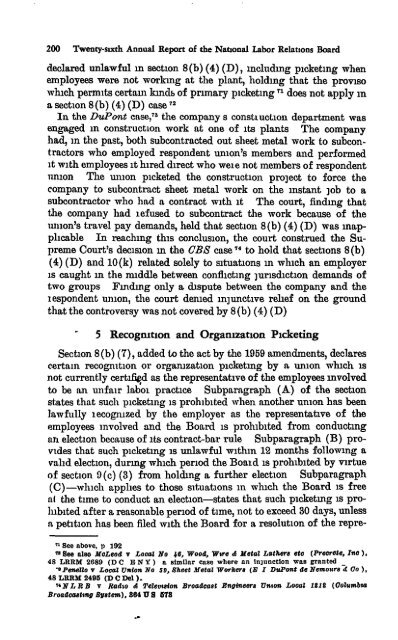TWENTY-SIXTH ANNUAL REPORT - National Labor Relations Board
TWENTY-SIXTH ANNUAL REPORT - National Labor Relations Board
TWENTY-SIXTH ANNUAL REPORT - National Labor Relations Board
You also want an ePaper? Increase the reach of your titles
YUMPU automatically turns print PDFs into web optimized ePapers that Google loves.
200 Twenty-sixth Annual Report of the <strong>National</strong> <strong>Labor</strong> <strong>Relations</strong> <strong>Board</strong><br />
declared unlawful in section 8(b) (4) (D), including picketing when<br />
employees were not working at the plant, holding that the proviso<br />
which permits certain kinds of primary picketing 71 does not apply in<br />
a section 8(b) (4) (D) case 72<br />
In the DuPont case," the company s consti notion department was<br />
engaged in construction work at one of its plants The company<br />
had, in the past, both subcontracted out sheet metal work to subcontractors<br />
who employed respondent union's members and performed<br />
it with employees it hired direct who weie not members of respondent<br />
union The union picketed the construction project to force the<br />
company to subcontract sheet metal work on the instant job to a<br />
subcontractor who had a contract with it The court, finding that<br />
the company had iefused to subcontract the work because of the<br />
union's travel pay demands, held that section 8(b) (4) (D) was mapplicable<br />
In reaching this conclusion, the court construed the Supreme<br />
Court's decision in the CBS case 74 to hold that sections 8(b)<br />
(4) (D) and 10(k) related solely to situations in which an employer<br />
is caught in the middle between conflicting jurisdiction demands of<br />
two groups Finding only a dispute between the company and the<br />
iespondent union, the court denied injunctive relief on the ground<br />
that the controversy was not covered by 8(b) (4) (D)<br />
' 5 Recognition and Organization Picketing<br />
Section 8(b) (7), added to the act by the 1959 amendments, declares<br />
certain recognition or organization picketing by a union which is<br />
not currently certiNd as the representative of the employees involved<br />
to be an unfair laboi practice Subparagraph (A) of the section<br />
states that such picketing is prohibited when another union has been<br />
lawfully iecognized by the employer as the representative of the<br />
employees involved and the <strong>Board</strong> is prohibited from conducting<br />
an election because of its contract-bar rule Subparagraph (B) provides<br />
that such picketing is unlawful within 12 months following a<br />
valid election, during which period the Boaid is prohibited by virtue<br />
of section 9(c) (3) from holding a further election Subparagraph<br />
(C) —which applies to those situations in which the <strong>Board</strong> is free<br />
at the time to conduct an election—states that such picketing is prohibited<br />
after a reasonable period of time, not to exceed 30 days, unless<br />
a petition has been filed with the <strong>Board</strong> for a resolution of the repre-<br />
71 See above, p 192<br />
72 See also McLeod v Local No 46, Wood, Wire d Metal Lathers etc (Precrete, lac),<br />
48 LRRM 2689 (D C ENY) a similar case where an Inpinction was granted<br />
-11 Penedlo v Local Union No 59, Sheet Metal Workers (B I DuPont de Nemours C Co ),<br />
48 LRAM 2495 (DC Del ).<br />
"NLRB v Radio ci Television Broadcast Engineers Union Local 1212 (Columbia<br />
Broadcasting System), 364 US 573

















